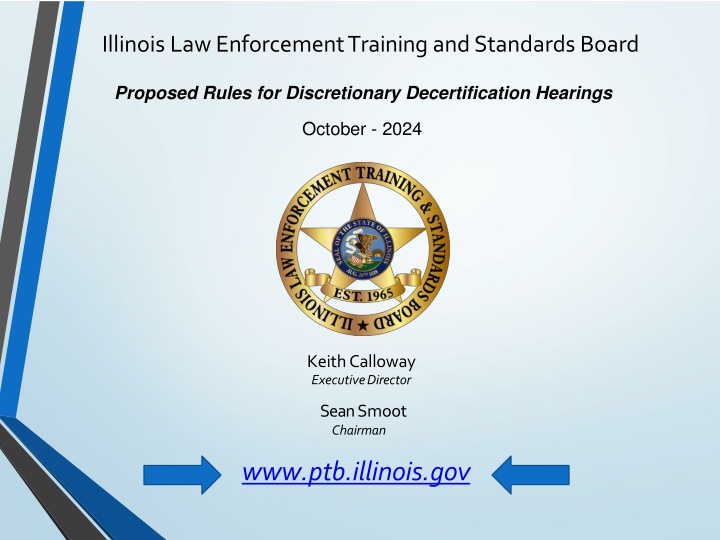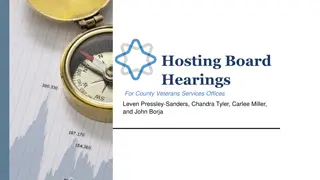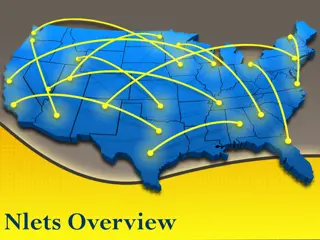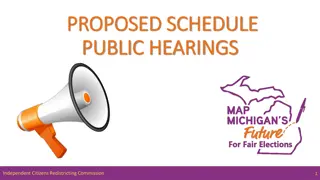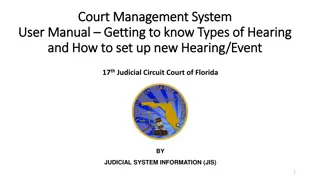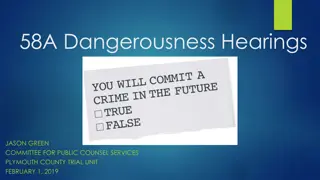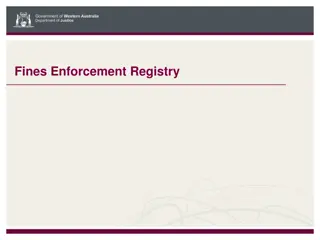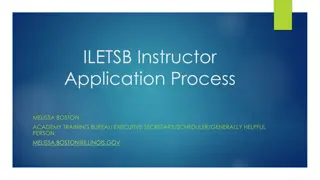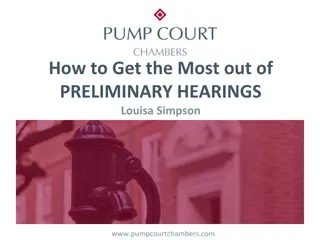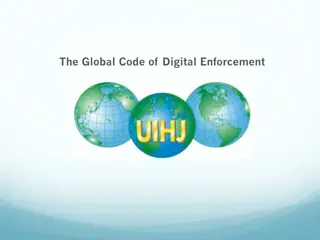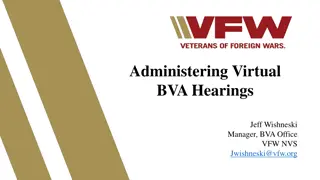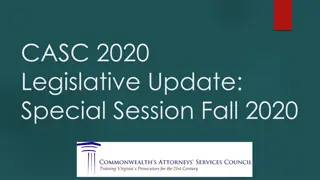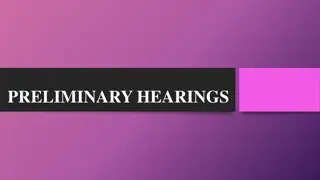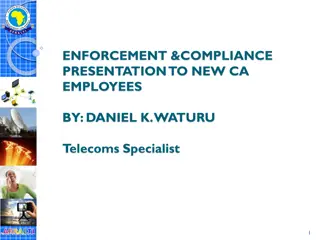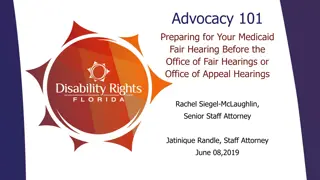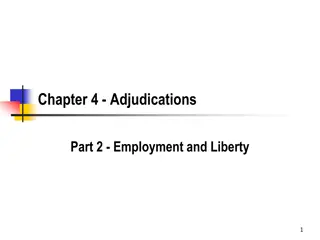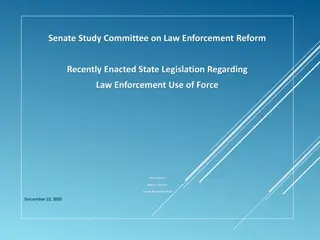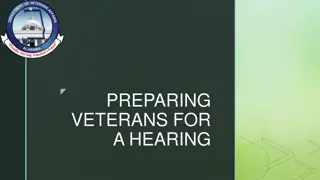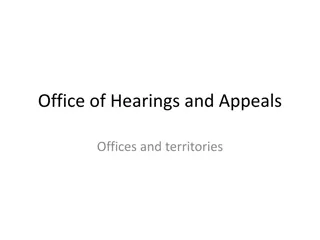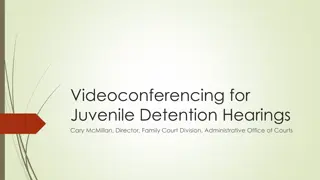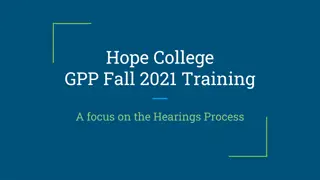Proposed Rules for Decertification Hearings by Illinois Law Enforcement Training Board
The Illinois Law Enforcement Training and Standards Board has proposed rules for discretionary decertification hearings, outlining criteria for decertification, violation conduct, preliminary staff reviews, and the process for administrative hearings and decision-making. The process includes notice of violation, investigation, review by a panel, and final decision issuance based on clear and convincing evidence. Additionally, guidelines for reactivation of officers are provided, emphasizing good character and absence of certain criminal convictions.
Download Presentation

Please find below an Image/Link to download the presentation.
The content on the website is provided AS IS for your information and personal use only. It may not be sold, licensed, or shared on other websites without obtaining consent from the author.If you encounter any issues during the download, it is possible that the publisher has removed the file from their server.
You are allowed to download the files provided on this website for personal or commercial use, subject to the condition that they are used lawfully. All files are the property of their respective owners.
The content on the website is provided AS IS for your information and personal use only. It may not be sold, licensed, or shared on other websites without obtaining consent from the author.
E N D
Presentation Transcript
Illinois Law Enforcement Training and Standards Board Proposed Rules for Discretionary Decertification Hearings October - 2024 Keith Calloway Executive Director Sean Smoot Chairman www.ptb.illinois.gov
NOV Preliminary Staff Review (e) (1) 6.3 violation Decertification conduct. (1) committed a felony or misdemeanor; (b) (2) exercised excessive use of force; (3) failed to intervene; (e) 30-day notice to agency, unless jeopardizes investigation recorded in 9.2 database (4) tampered with a dash camera or body-worn camera; (5) engaged in the following conduct relating to the reporting, investigation, or prosecution of a crime: committed perjury, made a false statement, or knowingly tampered with or fabricated evidence; and (6) engaged in any unprofessional, unethical, deceptive, or deleterious conduct.
Discretionary Decertification Notice of Violation State s Attorney Agencies Civilians 2022 - 39 2023 - 190 2024 - 188
Notice of Violation 50 ILCS 705/6.3(c) Preliminary Staff Review Professional Standards Division (e) (1) Formal Complaint For Discretionary Decertification (g) Assign to Close > Send Notice 30 days (e)4 Investigations (f) for Summary Report Administrative Hearing (h)(7) Recommendations to Review Panel Review PANEL 4 From Gov, 9 From AG Assigns to ALJ (h)
Administrative Hearing (h)(7) Clear & Convincing ALJ will make findings and recommendations (h)(7) Review Panel (h)(8) meets & reviews record & evidence in closed session Board issues decision (h)9
Board issues decision Majority vote (h)9 CERTIFICATION REVIEW COMMITTEE (H) 10 Officer - Active Officer - Decertified
Reactivation 50 ILCS 705/8.1, 8.2 Criteria for re-activation under 50 ILCS 705/8.1 (b)(1) 1. Be of good character pursuant to 50 ILCS 705/6 e. 2. Not convicted, as defined by 50 ILCS 705/6.1 (a-1), of any felony 3. Not convicted, as defined by 50 ILCS 705/6.1 (a-1) of any disqualifying misdemeanor as listed in 50 ILCS 705/6.1(a) 4. Not have been involved in any crime of moral turpitude as defined in 20 Ill. Adm. Code 1720.35 If Denied, officer may appeal per 6.3 to Review Panel
New Part: 1790 RULES OF PROCEDURE IN ADMINISTRATIVE HEARINGS 1790.100 Applicability 1790.120 Definitions 1790.130 Burden and Standard of Proof 1790.140 Filing and Service 1790.150 Form of Papers Filed 1790.170 Prehearing Conference 1790.200 Notice of Prehearing Conference 1790.210 Appearance 1790.250 Failure to Appear 1790.260 Amendment and Withdrawal of Complaints 1790.300 Answer 1790.310 Motions 1790.320 Joinder 1790.330 Postponement or Continuance of Hearing 1790.400 Remote Proceedings 1790.410 Discovery 1790.420 Subpoenas 1790.450 Administrative Law Judge 1790.500 Authority of Administrative Law Judge 1790.510 Ex Parte Communications 1790.520 Disqualification of Administrative Law Judge 1790.530 Contumacious Conduct 1790.540 Consent Decree 1790.545 Settlement Agreements 1790.550 Conduct of Formal Complaint Hearings 1790.560 Rules of Evidence 1790.570 Official Notice 1790.580 Hostile or Adverse Witnesses 1790.590 Documents 1790.600 Default 1790.610 Record in Contested Cases 1790.620 Briefs 1790.630 Administrative Law Judge's Decision 1790.645 Certification Review Panel 1790.650 Final Action by the Board 1790.660 Reconsideration of Board s Decision 1790.670 Judicial Review
Process of Development Research - Met with team from Georgia POST - Spoke with attorneys from Florida POST after watching hearings - Researched the Illinois Admin Code and other agency policies Consultation - Conversations with the Hearing Manager of IDFPR - Spoke with ARDC Senior Counsel - Discussed the hearing process with IDNR attorneys Drafting - Revised provisions from Dept. of Labor, IDFPR, and the ARDC - Modified sections after discussing with JCAR liaisons - Incorporated feedback from an independent mediator Review and Revise - Gather feedback from stakeholders - Incorporate modifications and suggestions Implementation - December 2024
Significant Provisions: Definitions Section 1790.120 Definitions "Administrative Law Judge" or "ALJ" means an attorney licensed to practice law in the State of Illinois who has been designated by the Director to conduct any hearings governed by this Part. "Complainant" is a party who, by written petition, seeks decertification, certification, or activation under any provision of the Police Training Act or any rule, order, or determination of the Board. "Respondent" is a person, officer, agency, or other legal entity against whom a complaint or notice initiating a proceeding is filed or to whom an order or complaint is directed by the Board. Panel means the Certification Review Panel as created by the Police Training Act. [50 ILCS 705/3.1]. "Evidence" means those matters considered evidence under the Illinois Rules of Evidence. [735 ILCS 5/Art. VIII]. "Hearing" means a formal proceeding in which the administrative law judge shall report any findings of fact, conclusions of law, and recommended disposition. [50 ILCS 705/6.3].
Significant Provisions: Standards Section 1790.130 Burden and Standard of Proof - The complainant shall have the burden of proof - By clear and convincing evidence Section 1790.140 Filing and Service - All pleadings, motions, briefs, and documents shall be electronically filed - A Board investigator shall serve the respondent - The Board investigator may serve the respondent by personal service or certified mail Section 1790.150 Form of Papers Filed - Documents shall clearly state a title, case number, and be on 8.5 x 11 paper - Exhibits shall be reduced or enlarged to conform to the size requirements - One copy of each document filed shall be signed by the party or by its authorized representative Section 1790.210 Appearance - A party may be represented by an attorney who is licensed in Illinois - Or licensed in another state on a pro hoc vice basis - Or in possession of a 711 license
Significant Provisions: Pleadings Section 1790.300 Answer - No later than 30 days after receiving the complaint respondent shall admit, deny or, no knowledge Section 1790.310 Motions - Must be in writing - 7 days to file a response - Not appealable, but decisions become part of the record for Panel review Section 1790.330 Postponement or Continuance of Hearing - Any party may request a continuance for due cause - Unavailability of a party or witness, illness, or other circumstances beyond the person's control. Section 1790.400 Remote Proceedings - May be allowed by agreement of all parties Section 1790.410 Discovery - Formal discovery not authorized - Must provide copies of documents 21 days prior to hearing - Mist list witnesses and documents at pre-hearing conference Section 1790.420 Subpoenas - May be issued by the ALJ - ALJ may issue responsive sanctions for non-compliance
Significant Provisions: ALJ Section 1790.450 Administrative Law Judge - Shall be a licensed attorney on contract - Intend to have at least 3 available - Working on experience requirements of the posting Section 1790.500 Authority of Administrative Law Judge - To conduct hearings - Administer oaths and examine witnesses - Make rulings on the applicability of rules and laws - To issue findings of fact and conclusions of law Section 1790.510 Ex Parte Communications - No substantive communication between ALJ and a single party - May conduct routine communications - Board staff may provide administrative assistance Section 1790.520 Disqualification of Administrative Law Judge - Motion may be made to a different ALJ - The ruling ALJ may refer to another ALJ Section 1790.630 Administrative Law Judge's Decision - Must make findings of fact in writing - Must be shared with the parties and the Certificaiotn Review Panel
Significant Provisions: Evidence Section 1790.560 Rules of Evidence - Supreme Court s Rules of Evidence shall apply - Objections, basis, and rulings must be made on the record - Protective Orders may be issued for sensitive materials - Evidence of misconduct and officer history is admissible Section 1790.570 Official Notice - Official notice may be taken of any material fact not appearing in evidence - Notice may be taken of technical or scientific facts within the Board's specialized knowledge - Parties shall be notified and allowed to contest any reports, memoranda or data - Board's expertise, technical competence, and specialized knowledge may be evaluated as evidence Section 1790.590 Documents - Business records and documents shall be admissible, if: - Relevant - Records or compiles data - Is made by a person with first-hand knowledge of the facts - Made at or near the time of the facts - Made as part of the regular practice of the activity; and - Kept in the course of regularly conducted activity
Significant Provisions: Conference Section 1790.170 Prehearing Conference - Upon the request of any party, the prehearing conference will be conducted - The purposes of the prehearing conference include: - Simplification of issues - Limitation of issues, witnesses, and evidence - Negotiating admissions or stipulations - Exchange of exhibits - Discussion of any other matter that may aid in efficient disposition of the case - Agreed dispositions - Joinder A prehearing conference shall include: - Presentation of any prehearing motions - Witness and exhibit lists - Disclosure of expert witnesses; and - Any other materials directed by an ALJ Section 1790.200 Notice of Prehearing Conference - Notice of Prehearing conference shall be served upon all known parties - May be by electronic or certified U.S. Mail, not less than 30 days before the hearing - A reference to the particular Section of the statutes and rules involved - A short and plain statement of the matters asserted
Significant Provisions: Review Panel Section 1790.610 Record in Contested Cases - Board shall keep a full and complete record of all proceedings: - All pleadings, including all notices and responses to those pleadings - A transcript of the hearing, if any, and all evidence received - Any offers of proof, objections to that proof, and rulings on that proof - Any proposed findings and acceptance - Any decision, opinion, or recommendations by the ALJ Section 1790.645 Certification Review Panel - Shall meet to review the ALJ s finding of facts, law, and recommended disposition - May deliberate on evidence and testimony and may consider weight and credibility - No new or additional evidence may be presented to the Panel - Simple majority of the Panel can recommend decertification or dismissal - The Panel shall prepare a summary report and Order Section 1790.650 Final Action by the Board - The Board shall issue a final decision to decertify, reactivate or take no action - If the Board rejects the Panel s decision, it must set forth facts and reasons in writing - The Board s decision shall be delivered to the last employing agency and the complainant
Significant Provisions: Reconsider Section 1790.660 Reconsideration of Board s Decision - The Review Committee is composed of 9 Board members from specific backgrounds - Within 30 days of the Board decision, the Panel or officer may file a motion for reconsideration - The written motion for reconsideration shall specify the particular grounds for reconsideration - Other party has 21 days to respond - The Brief shall: - Identify the questions of procedure, fact, law or policy to which objection is made - Identify that part of the ALJ's decision to which objection is made - Designate by precise citation of page the portions of the record relied on; and - Concisely state the grounds and arguments for the objection within 15 pages - The Review Committee may deny, grant, or grant in part and issue a new final decision Section 1790.670 Judicial Review - The party seeking judicial review will pay actual cost of preparing the administrative record - Actions for judicial review shall be filed where the hearing proceedings took place
Conclusion: These Rules: Incorporate the best practices of other agencies Build on the statutory requirements without adding new challenges Present clear expectations for officers, agencies, Board, and ALJ Ultimately: Fair: Shared burdens and reciprocal requirements Reasonable: Less formal that litigation while adhering to administrative standards Flexible: Allows the Board to implement the process quickly while also allowing it to grow and expand over time We look froward to gathering feedback and incorporating suggestions to make these the best they can be.
